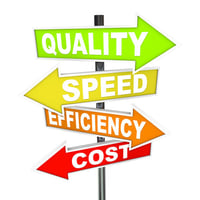10 Things Which Affect the Price You Pay for a pBone or pTrumpet
May 18th, 2020 | 3 min read

There are many things which affect the prices of our products, and ultimately what you the consumer will pay. It may surprise you to know that as the manufacturer we have very little control over the retail price from country to country!
We thought it would be helpful to be completely transparent about why you might see different prices for our instruments when searching for them either in stores on online…
-
-
Setting a Price
In many countries such as the UK and Europe, the competition authorities do not allow manufacturers to “fix” prices as this would be anti-competitive or as they call it “resale price maintenance”. There are a few exceptions to this, and large brands tend to manage consumer prices by selling very exclusively or even just in their own stores (think Apple for example).
-

-
-
Recommended Retail Price
Because of the laws above we can therefore only recommend retail prices. This is generally a good thing for consumers though because if price is the main factor which is driving your decision you have more choices and can shop around.
-
-
-
Cost of Delivery
If you also care about the carbon cost, then buying from a European retailer to post your order to the UK, and vice-versa for example might save you a few pounds or euros in your wallet, but certainly add CO2 emissions to your environmental bill!
-
-
-
Value Added Tax
Or Sales Tax is a big part of the amount consumers pay – in the UK this is 20% (VAT), however, it varies by country; in Australia, it is only 10% (GST), and in some countries, there is no local sales tax at all. For the typical £149 paid for pBone in Britain, almost £25 is tax which the retailer pays straight to the Government.
-
-
-
Location of Sale
Music dealers or
 retailers form a large part of our business. They are really important as they help make available our products to customers in their local towns, states or even globally. Some of the largest music retailers are public companies, so anyone can see how much dealer profit they make (typically between 20-30% of the cost you are paying).
retailers form a large part of our business. They are really important as they help make available our products to customers in their local towns, states or even globally. Some of the largest music retailers are public companies, so anyone can see how much dealer profit they make (typically between 20-30% of the cost you are paying).The dealer has a lot of bills to pay besides paying for the product itself: expert staff, the retail store, a smart website, maybe some online advertising, a warehouse, free shipping to the customer, and so on. Often music store owners are musicians or teachers themselves who are equally passionate about our industry as we are.
-
-
-
Period of Sale
Music dealers buy at different times of the year – some like to buy a lot of stock in one go, and some like to keep their stock very low, but either way currency and stock availability can affect the prices the retailers pay us.
-
-
-
Cost of shipping
This fluctuates too. If there is a lot of space on container ships or in airfreight then prices go down but if space is limited then prices go up; the final price paid by our customers therefore goes up or down accordingly.
-
-
-
Import Tariffs
Import tariffs or customs duties affect costs. This was in the news recently in the United States because President Trump added an extra 15% of import duty to all products made in China. Our products are generally very low for import duties at just 3% - this helps keep costs low for customers but of course, extra tariffs add extra costs can change this, as can currency fluctuations.
-
Cost of production
 As a business we have spent many millions of pounds in research and development – this was because no one had ever created plastic trombones and trumpets before us. By using automotive companies to make our products, we are able to automate a lot of our production methods.
As a business we have spent many millions of pounds in research and development – this was because no one had ever created plastic trombones and trumpets before us. By using automotive companies to make our products, we are able to automate a lot of our production methods.This means we now use a number of top manufacturers who keep the quality of the instruments super high whilst keeping the unit cost low. (We inspect our instruments by hand against a 100-point checklist or what we call the PDI (Pre-Delivery Inspection) you can read more about this here).
-
Production Volume
How much we make in one go is called production volume. Quality is better if you make a consistent amount each day, rather than rush a lot of products in one go – so it costs us a little more but it gives you and us better quality.
-
As you can imagine, all these factors are constantly moving up and down which means that prices will vary all the time!
Our advice to consumers is that while price is of course an important point to consider, if you have any flexibility in your budget, consider other factors when choosing from where you buy. In the modern retail world, consumers rightly have a lot of power (and responsibility) as to where they spend their hard-earned cash – so make sure you pick the right retailer for you and your family.
Read More...
Find out more about the quality standards of our instruments here.
Read about the sustainability of our instruments here.
Steven has over twenty years of experience working in the music industry. With degrees in Electrical Engineering and an MA in European Cultural Policy & Administration from the University of Warwick, where he now serves as a Course Tutor on their MA in Creative and Media Enterprises, Steven served as Executive Director of a non-profit international music association based in the United States from 2000 – 2007.
Steven is founder and CEO of Warwick Music Group now known as pBone Music, and started playing the trombone at the age of nine. Based in North Warwickshire, the company manufactures musical instruments that make the joy of music accessible. sustainable and fun including the world's first plastic trombone, pBone, which has sold over 250,000 units worldwide and won major international awards including the prestigious Queen's Award for Enterprise (Innovation) in 2019.
He was elected as a board director for the UK music industry trade body, the Music Industries Association, in 2019 becoming its chair in 2020, and is frequently interviewed or invited to present guest lectures on cultural entrepreneurship, music education, and the future of the music industry. At the request of the owner, Denis Wick, Steven joined the board of Denis Wick Products in 2021 subsequently being appointed their Chief Executive Officer in 2022, a role he performs alongside his role as CEO for pBone Music.
Steven lives in Warwickshire with his wife, Kate, their three young children, two ponies and a faithful labrador, and enjoys coaching his local youth rugby team.